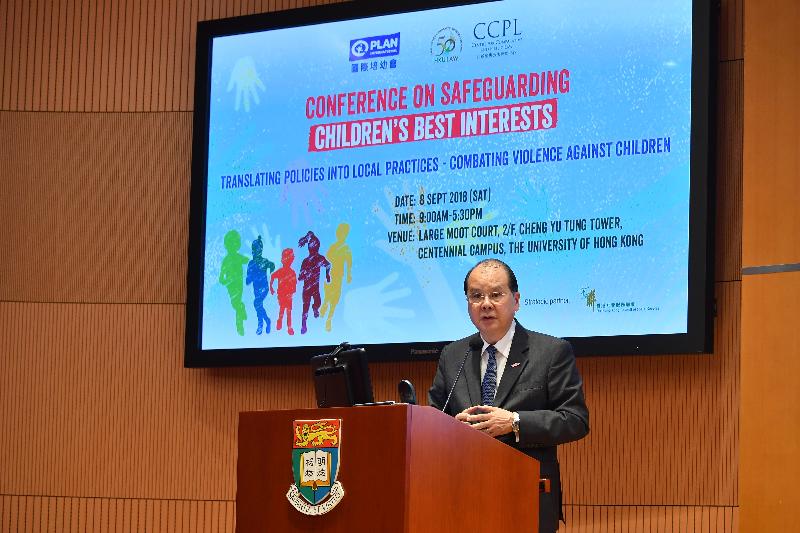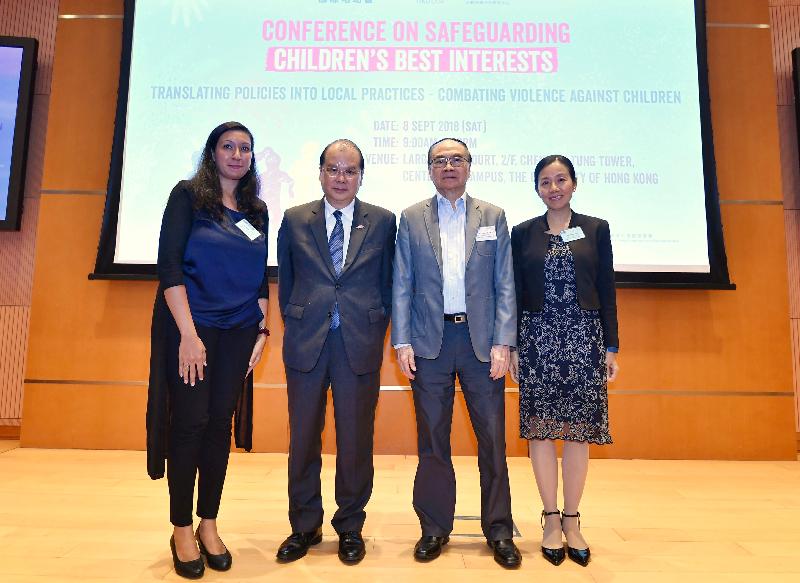Following is the concluding speech by the Chief Secretary for Administration, Mr Matthew Cheung Kin-chung, at the Conference on Safeguarding Children’s Best Interests today (September 8):
Puja (Associate Professor of the University of Hong Kong’s Centre for Comparative and Public Law, Ms Puja Kapai), Kanie (Chief Executive Officer of the Plan International Hong Kong, Dr Kanie Siu), distinguished speakers and Darwin (Board Member of the Plan International Hong Kong, Dr Darwin Chen), my good friend, ladies and gentlemen,
Good afternoon. First of all, my profound apologies. I should have been here for the opening remarks but somehow it clashed with a prior commitment because this is my fifth function today. I started working from nine o’clock this morning at the Convention Centre, addressing the 14th Asian Interventional Cardiovascular Therapeutics Congress held in Hong Kong with overseas delegates from Asia, the heart specialists. So it is a very important conference that I can’t say no because I have promised to do it. That’s why I negotiated with Puja. Can I do the closing remarks? She is very accommodating. Thank you. I am here because I don’t want to miss this very important occasion to communicate, to have a dialogue with so many important interlocutors, practitioners and academics at the field.
Let me explain why I am here. I am very keen to be here because I actually help set up Hong Kong first ever Commission on Children. We look at the whole problem. When it is sort of a macro basis, if you look at what I am doing now, you can tell why I am so keen to have this Commission.
I now chair the Commission on Children, that’s why I am here. I am also the Chairman of the Youth Development Commission. Children Commission is from 0 to 18 age cohort. Youth Commission is from 18 to 35. I also chair a new steering committee on ethnic minority. I also chair a new internal commission, the correct title is Human Resources Planning Commission to promote upward mobility of our population, taking care of young people. So, I look after the software of the Hong Kong’s government, i.e. the people. I am here to talk about it because I look after the whole thing holistically across the whole spectrum of the government administration. So, I am here to share my views on how we replace children in terms of the government policy agenda.
First of all, I would like to congratulate the Centre for Comparative and Public Law of the University of Hong Kong and the Plan International Hong Kong for the successful conclusion of the symposium, it must be a success. It couldn’t be otherwise. It provides a valuable platform for international and local experts to share their views and experience in the best practices to safeguard children’s rights.
As I said earlier, the Hong Kong Special Administrative Region (HKSAR) Government values greatly every child’s rights and attaches great importance to the well-being of our children. We firmly believe that every child has a right to protection against harm and abuse. Therefore, children’s happy and healthy growth and optimal development rank very highly on the current-term Government’s policy agenda.
I miss one point earlier when I introduce myself, I also chair the Commission on Poverty, because I see Sze Lai-shan sitting there at the back. I look after a series of issues including tackling poverty, young people and also women. They come under my umbrella because I used to be in the Labour and Welfare Bureau. So I look after a full spectrum of government high-level commissions and that’s why we are moving the whole things forward now.
Children of course forms an important component in the whole equation. We really mean business when it comes to protecting the interest and well-being of children. That’s why we set up this Commission on Children in June this year and had a very useful first meeting. We need to follow-up on the structure again because there are some views on the working group. One more action to be taken, achievable measures in a short time, short, mid or long term, so we are now trying to prioritise. When we come back to the second meeting we have the full strategy layout on the way forward.
The Commission comprises, of course, other relevant policy secretaries. If they can’t come, they delegate their second in command, the deputy, not the junior officers. I want decisions to be taken. I want this to be action-oriented. We need decision making and to really get things done, not just talk, talk, talk. And we want action, action, action. Now we cover a right spectrum of subjects and also of course representatives have to be represented as well. We’ve got education, healthcare, academia, child concern groups and of course, legal, loyal, arts and sports, community service, public relations, parents, of course, we can’t miss parents, and also non-Chinese speaking ethnic minorities and young people.
So you can see a full spectrum of people. It’s not sort of PR image thing, it’s new, get down to business, get things done. This first Commission on Children is designed as an on-going not a private basis. Action-oriented as I said, and also responsive and high-level body to provide level of steer, set policy direction, strategies and priorities on children’s issues, and more importantly to translate them into achievable Government policy measures and for implementation by different government bureaux and departments. One of our major focuses now is to work closely with all the relevant stakeholders, the NGOs, academia and so on, to explore how best to protect our young children and tackle any form of child abuse and violence. We are very concerned about child abuse and violence, in particular.
Apart from the establishment of this Commission on Children, we have also put in place various measures to safeguard the best interests of children in Hong Kong. Just give an example, in terms of legal protection, we have legislation to protect children from abuse. A good example is the Domestic and Cohabitation Relationships Violence Ordinance (Cap.189). The law provides that children affected by domestic abuse may apply for an injunction in their own right by their “next friends” against molestation by their parents or other specified relatives, and these children are protected regardless of whether they are residing with the abusers. You can tell how precise we are in terms of protecting children. You can resort to the “next friends” to protect them.
We have also published the “Procedural Guide for Handling Child Abuse Cases (Revised 2015)” for reference by engaging different professionals. When we say professionals, they are multi-disciplinary, cross-sectorial. We can’t operate in silos now. Various disciplines, various specialists involved. When it comes to children, social services, health services, doctors, nurses, social workers, psychologists; as well as education services, teachers, professionals, principals, law enforcement, the Police, social welfare officers. When they encounter suspected cases of child abuse, a multi-disciplinary team has to be mobilised. It can’t be left alone to the Social Welfare Department, the Police have to come in, other professionals, such as health and medical practitioners, psychologists, educationists, and so on.
Despite the safeguards in place, we are also mindful that there is room for improvement. We mustn’t be complacent. The road ahead is still pretty taxing. We have to continue to improve. We will continue to listen to the views of the public and introduce effective measures to enhance our child protection mechanism.
We all know children are our future pillars, our hope. Particularly in Hong Kong, as I always say that, we can’t leave any child behind, anyone counts. The reason is very simple, if you look at Hong Kong’s demographic structure, we’ve got a population of 7.4 million now. If you take away 380 000 foreign domestic helpers and professionals working in Hong Kong, investors living in Hong Kong, as they come and go. Some make Hong Kong their home of course, but some leave Hong Kong after a certain period, they go back to their country. We left with only 6.9 million local populations here. The fertility rate is among the lowest in the world. For a child-bearing woman, the average fertility rate is less than 1.2 per cent whereas the normal replacement rate in the world is 2.1 per cent, so we’ve got a deficit of 0.9 per cent there. Add to the problem, our population is aging rapidly. At the moment, we’ve got 1.21 million Hong Kong people aged 65 or above, we call them senior citizens. But every year we got 60 000 of the population leading to that cohort, which means that in 20 years’ time, our senior citizens will double from 1.21 million to 2.42 million, which represents around 31 per cent of the population will become so-called senior citizens in Hong Kong.
You can imagine the challenge will be huge. That’s why every child is our future, replacement for the labour force, and also propel Hong Kong forward with upward mobility.
Every single child counts. We must protect them, nurture them, give them meaningful development and enrich their potential to the full. That’s why, in the process, protecting them of course is important, enabling them, educating them, empowering them are also very important. Not just protecting them from harms, abuse, we also have to nurture them, make sure they got upward mobility, contributed to the community, contributed to the world. So we are talking about a multi-faceted challenge here when it comes to children’s business. That’s why government cannot do it alone, we must count the support of the entire community.
Effective child protection is always premised on close collaboration, mutual trust and care and as I said multi-disciplinary approach is called for. We need the support and wise counsel from all quarters of the community, including of course all of you here today. We have to pick your brain, and also through the expertise, the experience as we try the way forward to promoting the welfare of our children.
I will conclude this closing remarks, I don’t want this to be long-winded, but just want to repeat a few points. We attached great importance to enhancing the well-being, protecting the basic rights, the best interest is the key words, if you search on the google engine, best interest underpins the entire philosophy of child protection, negative, positive, in terms of prevention, promotion, nurturing, all best interests of the kids, of the children. This is a very good symposium, I am sure it marks the beginning and a lot more to come in the future, I can come from time to time to share my experience and to report my work progress to all of you here.
Thank you very much and for overseas participants who travel all the way here, make sure you take a bit of time out and see a bit of Hong Kong, do some shopping in Hong Kong as well. Thank you very much.





